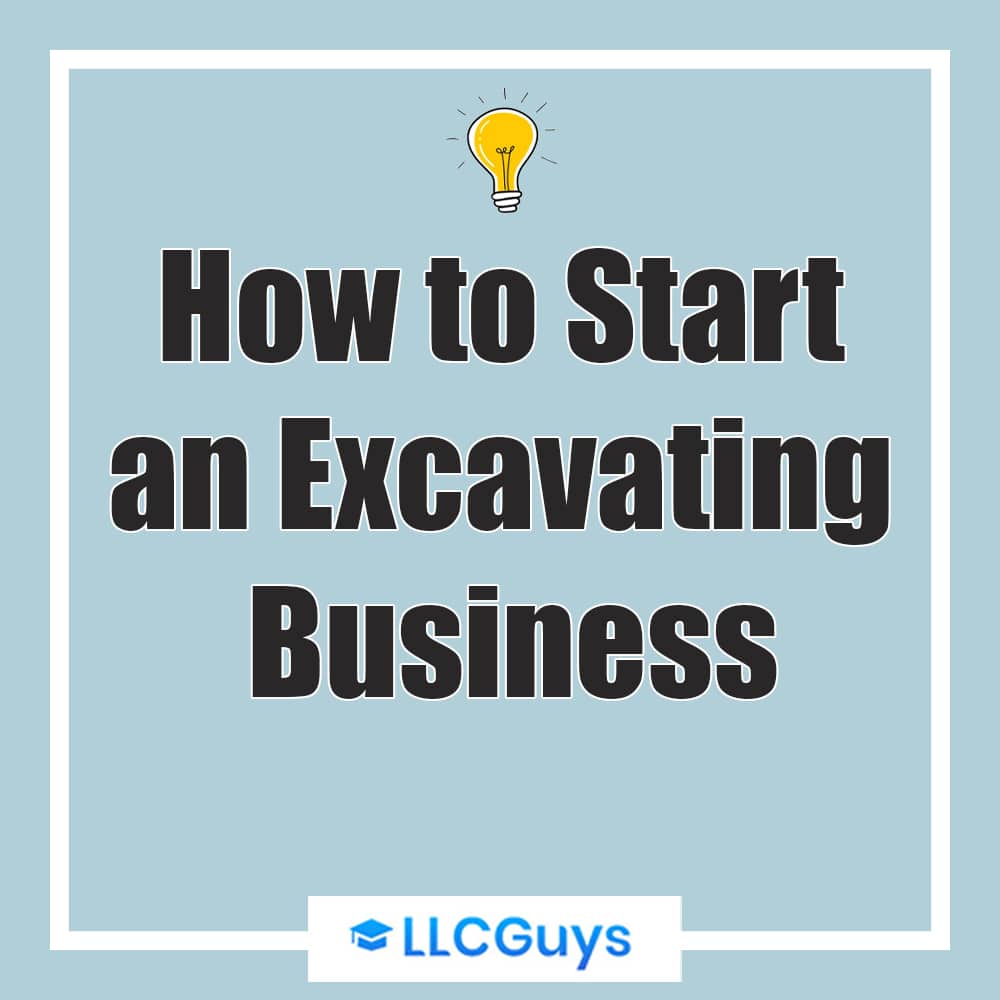How to Start an Excavating Business? A Comprehensive Guide for New Entrepreneurs

Starting an excavation company may be a successful and satisfying job. This undertaking, however, is not without its difficulties and risks. For one thing, operating and maintaining various types of heavy machinery such as bulldozers, backhoes, and cranes requires a lot of hard labor, long hours, and particular abilities. Furthermore, market competitiveness will be determined by the amount of cash invested at the start-up stage, as well as the reputation built up during the first few contracts completed while establishing the digging firm.
Starting an excavation company starts from your LLC incorporation. Make the 1st step today and use professional help to start your LLC:
Anyone launching an excavation company should assess their abilities and expertise.
The first step in launching an excavation company is to assess your present abilities, expertise, and equipment. If you’re reading this post because you want to establish your own business as an independent contractor but don’t have any experience or training, you should try working for another firm for a year or two first. This would serve as a foundation for comprehending key logistical aspects of negotiating excavation contracts, such as bid submissions and project planning. It would also provide a firsthand look at how to collaborate with other experts, including as building engineers and environmental conservation specialists, to guarantee that local and federal rules are followed. To put it another way, running an excavation company requires a lot more than just understanding how to move the ground.
An excavation company may be engaged to remove the space for the basement foundation.
When it comes to equipment, it’s best to start with the basics. Obviously, some cash or the capacity to finance equipment with a fair repayment arrangement will be required. However, a backhoe is the most significant piece of equipment to start with because the most usual duty is to dig out the area where building will take place. Furthermore, a large number of minor operations employing this one piece of equipment may quickly add to the contract and referral portfolio. For example, homeowners sometimes hire a small excavation company to dig trenches and improve drainage around their homes’ foundations, as well as excavate land for a man-made pond or other landscaping tasks.
Obtaining special permits in some places may be required to start an excavation firm.
If you want to establish an excavation firm in your location, you’ll need to look into any needed licensing requirements. A general business license is usually required, and specialist equipment, such as a backhoe or bulldozer, will almost certainly require further licensing. Depending on the services you want to provide, you may need to get a home contractor’s license in some places. Most contractors also get liability insurance to cover their own assets as well as the companies.
Steps on Forming an Excavating Business
Do you want to establish an excavating business from the ground up? Or do you want a template for an excavation business plan? If you answered yes, continue reading. Starting an excavation firm, like any other business that involves a large amount of beginning cash and a mix of technical and non-technical abilities, may be difficult and time-consuming to get up, but it can be a lucrative enterprise if carefully managed.
An excavation firm is needed not only by a community that wants to excavate sand and build a channel or passage somewhere in the community but also by an individual who wants to excavate a section of his or her land for construction purposes.
One of the first things you’ll need to do is to form an LLC for your new excavation business.
1. Perform Feasibility Studies

Conducting extensive feasibility studies is the first and most critical step to take before stepping out to start any business. The need for thorough feasibility studies cannot be overlooked during a company’s lifespan.
So, in your quest to establish your own excavation firm, it’s critical that you do a thorough market study – feasibility studies so that you can learn firsthand what it takes to effectively launch this sort of business in the region of your choosing.
2. Develop the Technical Skills Necessary

In reality, a person may start and operate his own excavating firm from the ground up before hiring individuals to support him as the business grows. If you plan to establish your own excavating firm, you need to take the time to gain the necessary technical abilities. You’ll need to learn how to operate heavy machinery such as tractors, bulldozers, backhoes, and forklifts, among other things.
3. Create a Business Plan

Once you’ve decided that starting an excavation company is the appropriate move for you, you should start working on a solid excavation company business plan. You have the option of doing it yourself or hiring an expert to assist you.
The bottom line is that operating a business without a business plan is not a good idea, especially for capital-intensive firms like Excavation Company. The reality is that a complete feasibility study will make writing a successful business plan much easier since all of the information you’ll need will be available.
4. Fund Your Business Capital

Because cash is a company’s lifeblood, you should create strategies to raise startup financing before beginning your company. Before you make preparations for how to obtain starting capital for your firm, you need to have a better sense of how much money you’ll need to start the business from the ground up.
One advantage of feasibility studies and business plans is that they will give you a better idea of how much money you’ll need to start the sort of business you desire.
In fact, you’ll be able to find out the costs of all the equipment and tools you’ll require, as well as much more. So, once you’ve calculated how much money you’ll need to start your firm, the next stage is to raise the funds through bank loans, investor loans, or borrowing from family and friends.
5. Rent a Yard / Workspace

This sort of business requires a building large enough to house all of your heavy-duty equipment as well as room for maintenance and service. So, before hiring a realtor, make sure you have a solid concept of the area that will be large enough to fit your equipment.
The reality is that obtaining vast space in major cities is expensive; your best alternative is to relocate to the outskirts of town. It is economical to do so.
6. Invest in Your Tools and Machinery

If you’re beginning your own excavating firm from scratch, the number of heavy-duty machines you’ll require will be limited. However, if you intend to start a typical excavation firm from the ground up, you will need to invest in heavy equipment such as cranes, bulldozers, backhoes, trucks, and forklifts, among other things. The reality is that these items may be rather costly, especially if they are purchased brand new.
You can obtain rates from manufacturers or the local dealer of such heavy-duty equipment in your area. It’s vital to note that you may start this sort of business using used heavy-duty equipment; they’re less expensive, but you’ll have to spend more on upkeep and repairing worn-out parts.
7. Contracting Source

If you’ve successfully set up an excavation company, the following stage is to look for contracts and advertise your company. Simply verify that your business card is properly printed, and then develop a business proposal that you can submit to construction businesses, community leaders, your state’s or council’s ministry of public works, and any other group that you believe will benefit from your services.
You may also create a formal website for your company. There you have it: the foolproof steps to starting your own excavating firm.
Necessary Details Before Starting an Excavating Business
If you operate a firm that may profit from a work facility that is specifically tailored to your needs, you may have contemplated destroying a building on a prime site and starting over with a new headquarters or manufacturing factory. Small firms must sometimes determine if relocating into an outdated facility – which may require major repairs – is more cost-effective than demolishing the structure, and this choice can only be made with a credible estimate of demolition expenses.
Tip
For any large demolition project, professional demolition contractors will usually issue a free quote. The company’s estimate will be based on a number of criteria, including the job’s size, local permit requirements, unique materials handling (such as asbestos removal), and the ease or complexity of the individual site. However, based on the criteria discussed in this article, you may obtain a basic estimate of anticipated expenses.
Costs Determined by Location
Whether you want to demolish a business or residential structure, demolition charges vary greatly based on where you live. In general, demolition expenses are lower in the South and Midwest, whereas they are higher in areas along the East and West coasts. Also keep in mind that certain cities aim to discourage building destruction in favor of repair, therefore demolition permits are far more expensive.
A building’s demolition cost is generally proportional to its square footage. The national average for commercial demolition is generally between $4 and $8 per square foot, therefore calculating the square footage by a dollar figure in that area can give you an indication of the expenditures. Keep in mind that as the square footage increases, the cost per square foot decreases, allowing you to save money on larger projects and that the national average for pulling down a commercial structure is roughly $30,500.
Costs are affected by unusual circumstances
After considering national averages and adjusting your thinking depending on region, you should examine any unique conditions that might increase the demolition cost. If the structure includes asbestos or other hazardous materials, the removal of the hazardous material might cost an extra $2 to $3 per square foot.
Permits for demolition are an extra cost. A demolition permit costs roughly $200 on average, but it may cost as much as $10,000 or more if you live in a city that prohibits destruction. The cost of hauling trash to a landfill is also factored into the total cost of demolition. The cost depends on the kind of waste, such as wood, concrete, plaster, or metal, as well as the distance between the construction site and the nearest disposal facility.
Costs Included and Excluded
Then keep in mind that demolition is defined as the full destruction of a structure down to its foundation. As a result, the destruction of the present building’s foundation may or may not be included in a demolition estimate. If your project needs a new foundation, you may need to adjust your overall demolition cost estimate.
Typically, your demolition contractor’s quotation covers the full demolition process, including permits and waste collection, but knowing how much those elements add to your total cost, based on national averages, is helpful. You may also try to save money on a demolition bid by taking on some of the work yourself, such as debris disposal. Calling around for a good bargain on a dumpster or hauling service might help you save money overall.
FAQ: Creating an Excavation Business
What Services Does An Excavation Company Provide?
An excavation firm mostly excavates ground for the construction of buildings. Drilling shafts, foundation digging, drilling and grading, and other operations have been reported. These firms’ excavation work might include new construction, expansions, changes, and repairs.
What Is The Excavation Process?
Trenching, digging, dredging, and site development are all methods used in excavation.
What Excavation Equipment Is Used?
Excavator. Excavators are a common kind of construction equipment in the civil construction sector. Their primary function is excavation, but they are also employed for a variety of other tasks such as heavy lifting, demolition, river dredging, tree cutting, and so on.
How Should Excavation Be Marked?
White spray chalk, water-based UV paint, or an analogous non-permanent marking medium can be used to indicate the excavation site on paved surfaces. White flags, stakes, whiskers, and other similar items can also be used.
What Is An Alternative To Excavation?
Digging.
What Are The Different Excavation Methods?
- Excavation using cut and fill
- Basement excavation Trench excavation
- Excavation of roads and bridges
- Excavation in excess
- How Do You Expand An Excavating Company?
- Sending introduction letters to building companies in conjunction with your brochure
- Advertise in blogs and forums on the internet, as well as on social media.
- Promote your company directly.
- Advertise your company in local newspapers, television and radio stations.
- Advertise your company in the yellow pages (local directories)
- Encourage people to employ word-of-mouth advertising (referrals)
How Do You Come Up With Excavation Service Company Names?
Follow industry trends, but make sure that whatever name you choose for your excavation company is acceptable to your target market.
What Happens After the Excavation Is Completed?
Layout the foundation after excavation and backfill the excavated area surrounding the foundation with earth.
What Types of Insurance Do Excavation Contractors Need?
Excavation contractors need general liability insurance because it protects them and their firm. Excavation contractors are subject to the same legal requirements and risks as bigger construction companies. They might be sued for inflicting property damage, physical harm, or false advertising.
How Long Does It Take to Master Excavator Operation?
An excavator school, such as HEC, can teach you how to operate one in three weeks. You’ll receive hands-on experience on excavators as well as backhoes, skid steers, and wheel loaders.
How Do You Calculate Excavation Costs?
You figure it up depending on how long the excavation will take. Similarly, depending on the capability of other equipment, labor, and so forth.
How Much Can You Excavate In A Day?
It depends on the kind of soil and the equipment category. With a JCB (about 40HP), you can excavate roughly 30-40 Cum per Hour in regular gravelly soils, and 35-45 Cum per Hour in sandy soils. In the case of Escors Ex 60, it may boost workability by roughly 20%.
What are some names of professional excavation firms?
- Excavation Contractors of the West Coast®, LLC
- Excavation Company Danny Gee®, Inc.
- Excavation Contractors Moses Cape®, LLC
- Excavation Contractors, Larry Posh®, Inc.
- Excavation Experts, Inc., Nation Wide®
What is the formula for calculating topsoil excavation?
Simply measure the size of the area you want to cover and multiply by the depth necessary to get how much topsoil you’ll need. The simplest method is to measure in meters, as this will tell you the volume of topsoil required in cubic meters.
What Are The Different Excavating Equipment Types?
- Excavator
- Loader for backhoes
- Bulldozer
- Loader crawler
- Loader on skids
What Is the Purpose of Dirt Excavation?
- Save it for later use.
- Take it to a Landscape Contractor
- Look for a C&D Recycler.
- Excavation Contractors Insurance: Why Do You Need It?
- To shield you from any liability that may occur as a result of your work.
What Jobs Can A Mini Excavator Perform?
- Snow removal
- Hole-digging
- trenching in tiny areas
- Taking down minor buildings
- Sewer line repairs
- Landscape design
- Swimming pools or garden ponds are dug.
- How Do You Begin An Earth Moving Company?
- Choose the sort of earthmoving company you want to start.
- Calculate your costs and buy the necessary equipment.
- Receive money, select a business entity, register your company, and obtain federal and state tax identification numbers.
- Obtain the appropriate permissions and licenses
- Choose a place.
- Purchase insurance protection.
- Promote your company.
What Is The Difference Between A Construction Manager And A General Contractor?
During the pre-construction phase of a project, a property owner hires a construction manager. A general contractor, on the other hand, is chosen by the customer through a bidding procedure and is involved throughout the building process.
What Is The Difference Between A Construction Manager And A General Contractor?
During the pre-construction phase of a project, a property owner hires a construction manager. A general contractor, on the other hand, is chosen by the customer through a bidding procedure and is involved throughout the building process.
How Do You Grow A Contracting Company?
Self-employed persons work for their own clients and are their own employers, unlike contractors and subcontractors who are hired by a customer to perform on a specific project. When it comes to scheduling, self-employed people have a bit more flexibility than contractors.
When Is The Most Appropriate Time To Hire An Excavator?
The best time to buy them is a few days before you need them. You may save money by paying for a service in advance.
What Are the Most Common Risks in This Industry?
- Worker injuries and accidents are caused by safety risks.
- Change order management.
- Incomplete designs and an unclear scope
- Site conditions are unknown.
- Contracts that aren’t well-written.
- Material costs have risen unexpectedly.
- Shortages of labor.
- Equipment and tools are damaged or stolen.
- Is It Possible To Earn Money With A Mini Excavator?
- Yes, a tiny excavator may be profitable.
How Many Hours On An Excavator Is Too Many?
A well-maintained, high-quality micro excavator (also known as a small excavator) may last up to 10,000 hours. Heavy usage and neglect can easily lower this to around 8,000 hours.
How Can Excavation Injuries Be Prevented?
Set aside at least 2 feet of spoils and equipment from the excavation site.
To keep equipment and spoils from falling back into the excavation, use retaining devices like a trench box that extends over the top of the trench.
What Are Some Things You Shouldn’t Do With An Excavator?
Never attempt to operate an excavator until you are fully seated and in command. When operating on tough terrain or in busy regions, slow down the excavator. During transit, keep the bucket low to the ground. This will improve machine visibility and stability.
Why Do Mini Excavators Cost So Much?
The size of the unit is the most important aspect in pricing micro excavators. Larger units, which are designed to move more dirt and debris quicker, will cost significantly more than smaller units. These apartments’ prices rise when additional features are added.
Who is the most dependable excavator manufacturer?
Caterpillar.
When digging with an excavator, what is the best position?
The trucks should come down the left side of the excavator, according to most experts, as this provides the optimum loading angle and vision.
What is the average amount of fuel used by an excavator per hour?
The trucks should come down the left side of the excavator, according to most experts, as this provides the optimum loading angle and vision.
What is the formula for calculating excavator fuel consumption?
Excavators’ fuel usage is often measured in gallons per hour. Simply divide the amount of litres of diesel necessary to fill the excavator’s fuel tank by the number of hours the machine has operated to get the fuel consumption.
What Is The Most Economical Mini Excavator?
The following are the most popular small excavators on the market:
- Mini excavator Takeuchi TB216H
- Mini excavator Kubota U55-4
- Caterpillar 301.8 mini excavator Bobcat E50 mini excavator
- Mini excavator Kubota KX040-4
- Agrison ME850 small excavator Sunward SWE18UB mini excavator
Who Makes the Most Affordable Mini Excavator?
Used excavators are a good option if you’re seeking for the cheapest mini excavators. In this situation, the cheapest mini excavator models from Bobcat, John Deere, Hitachi, Terex, Case, and CAT, or any other tier-4 certified brand, are recommended.
Is It Possible To Grade With A Mini Excavator?
Compact excavators can undertake every sort of excavation operation on a smaller scale, including trenching, grading, material handling, and operating attachments, where space is restricted or efficiency is a necessity.
FAQ: Various Costs Associated With Excavating
Is operating an excavator company profitable?
Getting an excavator may be a wonderful investment if you have enough work to justify it and are willing to pay for its maintenance.
How do you expand an excavation company?
- When you brand yourself clearly, simply, and consistently, you improve your reputation.
- It’s all about networking…and network some more.
- Keep up with the latest news and accomplishments in your local market…
- A badly designed website can harm your company’s reputation, and a terrible website can hurt your sales.
How much does an excavating company charge?
Excavators in New South Wales charge $90 per hour, and excavators in Queensland and Victoria charge the same amount. The Australian Capital Territory has the highest cost of renting excavators and earthmovers in the country, at roughly $100 per hour.
What is the price of excavation equipment?
Excavators are made up of two fundamental components: a driving base and a digging and lifting arm. Excavators are the most costly piece of construction equipment, costing $100,000 to $500,000 for full-size rigs and $80,000 to $150,000 for compact excavators.
How can you figure out how much excavation will cost?
Excavation expenses may be approximated in general by multiplying the excavation price per unit by the total excavation volume. Assume you wish to dig a hole that is 2 meters long, 2 meters wide, and 2 meters deep. On the market, excavation costs $10 per cubic foot.
How can you expand your excavating company?
- It’s a good idea to think about your clients’ demographics. You may not be a marketing expert, but you may still improve the effectiveness of your efforts by performing some marketing work.
- Platforms should be chosen based on their intended use.
- Make certain your material is pertinent.
- Know when to promote your posts if you wish to do so.
In a day, how much can an excavator dig?
A hydraulic excavator, in other terms, can dig 242 feet. A day’s labor yields 4242 m3 of dirt.
How much money can you make as an excavating business owner?
The average compensation for excavating contractors in the United States is $87,400. Salary varies from $52,350 to $155,200 per year. Excavating Contractors in the middle make 87,400 dollars, while the top 80% earn 155,200 dollars.
Is it possible to generate money with a tiny excavator?
Breaking. Compact excavators are great for demolition work, and they can typically finish small-scale jobs in a single day. An excavator and breaker can be used to break up pavement, walkways, paths, swimming pools, and concrete roadways.
How much money can a tiny excavator bring in?
Weekly PayAnnual SalaryTop Earners
$50,000$96175th Percentile$45,500$875Average $35,500$68225th Percentile$40,718$783
How much will it cost to establish an excavation company?
For excavating equipment, specialty pieces normally cost between $10,000 and $100,000. You should start with the most often used excavators, and larger or less frequently used equipment can be hired as needed. A little excavator can handle most modest home projects.
What does it cost to establish an excavating company?
Obtain the Required Equipment Excavating equipment for special projects might cost anywhere from $10,000 to $100,000 or more. You should start with the most often used excavators, and larger or less frequently used equipment can be hired as needed. Mini excavators can handle the bulk of modest home operations.
What kind of profit can you make in your own excavator?
| Job Title | Annual Salary | Weekly Pay |
| Excavator Owner Operator | $142,440 | $2,739 |
| Work From Home Excavator Owner Operator | $81,052 | $1,559 |
| Remote Excavator | $66,893 | $1,286 |
| Work From Home Excavator | $58,910 | $1,133 |
Is it possible to generate money with an excavator?
When fitted with the correct attachments and a coupler system, compact excavators may perform a broad range of jobs (apart from excavation) and generate new revenue streams. Consider these five ideas if you’re looking for fresh ways to make money with your small excavator.
How much money can a little excavator bring in?
| Annual Salary | Monthly Pay | |
|---|---|---|
| Top Earners | $50,000 | $4,166 |
| 75th Percentile | $45,500 | $3,791 |
| Average | $40,718 | $3,393 |
| 25th Percentile | $35,500 | $2,958 |
What does an excavation firm earn?
Excavating Contractors make an average of $87,400 per year in the United States, with salaries ranging from $52,350 to $155,200. Excavating Contractors earn an average of $87,400 per year, with the top 20% earning $155,200.
How much money can a tiny excavator bring in?
| Annual Salary | Weekly Pay | |
| Top Earners | $50,000 | $961 |
| 75th Percentile | $45,500 | $875 |
| Average | $40,718 | $783 |
| 25th Percentile | $35,500 | $682 |
In Conclusion
In the end, a well-positioned excavation firm will attract a wide range of clients, including corporate and non-corporate clients, individuals, and communities. Excavation businesses do occasionally receive government contracts, and these contracts are usually lucrative.
Starting an excavation firm involves long-term planning, training, and a large financial foundation, particularly for the acquisition of heavy-duty equipment such as cranes, bulldozers, backhoes, trucks, and forklifts, among other things. Let’s take a look at seven sure-fire strategies to follow in order to effectively begin your own excavating company from the ground up and grow it to profitability in record time.
And don’t forget, starting a business begins from the 1st step – incorporating an LLC.
We highly advise using Zenbusiness or Northwest Registered Agent to start your excavating LLC.


